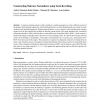Free Online Productivity Tools
i2Speak
i2Symbol
i2OCR
iTex2Img
iWeb2Print
iWeb2Shot
i2Type
iPdf2Split
iPdf2Merge
i2Bopomofo
i2Arabic
i2Style
i2Image
i2PDF
iLatex2Rtf
Sci2ools
VIROLOGY
2008
2008
Constructing malware normalizers using term rewriting
A malware mutation engine is able to transform a malicious program to create a different version of the program. Such mutation engines are used at distribution sites or in self-propagating malware in order to create variation in the distributed programs. Program normalization is a way to remove variety introduced by mutation engines, and can thus simplify the problem of detecting variant strains. This paper introduces the "normalizer construction problem" (NCP), and formalizes a restricted form of the problem called "NCP=", which assumes a model of the engine is already known in the form of a term rewriting system. It is shown that even this restricted version of the problem is undecidable. A procedure is provided that can, in certain cases, automatically solve NCP= from the model of the engine. This procedure is analyzed in conjunction with term rewriting theory to create a list of distinct classes of normalizer construction problems. These classes yield a list of ...
Related Content
| Added | 16 Dec 2010 |
| Updated | 16 Dec 2010 |
| Type | Journal |
| Year | 2008 |
| Where | VIROLOGY |
| Authors | Andrew Walenstein, Rachit Mathur, Mohamed R. Chouchane, Arun Lakhotia |
Comments (0)

